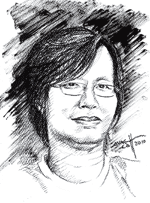
COMMENTARY
| By KYAW ZWA MOE | Tuesday, June 28, 2011 |
In the three months since Burma's Parliament swore in a quasi-civilian government on March 30, the country has seen a significant increase in visits from foreign policy makers, ministers and diplomats.
Since mid-May, at least nine senior officials and delegations have visited Burma, including US Senator John McCain, a fiery critic of the country's ruling regime; US Deputy Assistant Secretary of State Joseph Yun; a high-ranking EU delegation; acting UN Special Envoy Vijay Nambiar; and Russian Deputy Minister of Foreign Affairs Alexey Borodavkin.
This doesn't even include a number of visits by high-ranking officials from China, India and other neighboring countries that enjoy friendly relations with Naypyidaw. And later this week, Australian Foreign Minister Kevin Rudd will become the latest to travel to the country to meet with government leaders and democracy icon Aung San Suu Kyi. Still others are expected to arrive in the coming weeks.
 |
| Kyaw Zwa Moe is managing editor of the Irrawaddy magazine. He can be reached at [email protected]. |
But before we read too much into Naypyidaw's sudden enthusiasm for meeting and greeting, perhaps we should ask who isn't on the invitation list. Not surprisingly, the new government has pointedly excluded at least one senior United Nations official: Tomás Ojea Quintana, the UN's special rapporteur on human rights in Burma, who was turned down for a visa in late May.
Is it a coincidence that Quintana is also the person who last year initiated calls for the establishment of a UN Commission of Inquiry (CoI) into the Burmese regime's alleged war crimes and crimes against humanity? Not likely. This is a very serious issue for the new government, most of whose cabinet ministers were generals in the junta that ruled until earlier this year, so it should come as no surprise that Quinta remains persona non grata.
It is slightly more surprising, however, that Hollywood star Michelle Yeoh has also been denied entry into Burma. Yeoh, who arrived at Rangoon International Airport on June 22, was deported on the next available flight, despite having successfully entered the country last December to meet with Suu Kyi, who she portrays in an upcoming biopic.
Clearly, then, the era of blacklisting foreigners suspected of harboring sympathies for the wrong elements in Burmese society is not yet over. So it may be too soon to draw optimistic conclusions from Naypyidaw's willingness to put out the welcome mat for select visitors.
That said, even John McCain, a longtime critic of Burma's military rulers, made a point of saying that the mere fact that he was able to visit earlier this month must signify something. “It was the first time I had been allowed to return to the country in 15 years, which is one indication that this new civilian government could represent a change from the past,” he said at the conclusion of his trip, which included a meeting with Suu Kyi and other opposition leaders, as well as government officials.
Last week's fact-finding trip by an EU delegation similarly yielded some cautiously positive remarks on Burma's direction.
“We see that something is happening in this country. We are trying to understand it a little better,” said the delegation's mission chief, Robert Cooper, noting that President Thein Sein's speech to Parliament, in which he talked about good governance, clean government and elimination of poverty, was encouraging.
He added, however, that even though the new regime is making the right noises, it needs to take it a step further and start addressing these issues in the real world, not just in the cavernous halls of Burma's new legislature.
“We will be more encouraged if some of those ideas are implemented further.
1 | 2 
|
||
|
||


Thailand Hotels
Bangkok Hotels
China Hotels
India Hotels

|